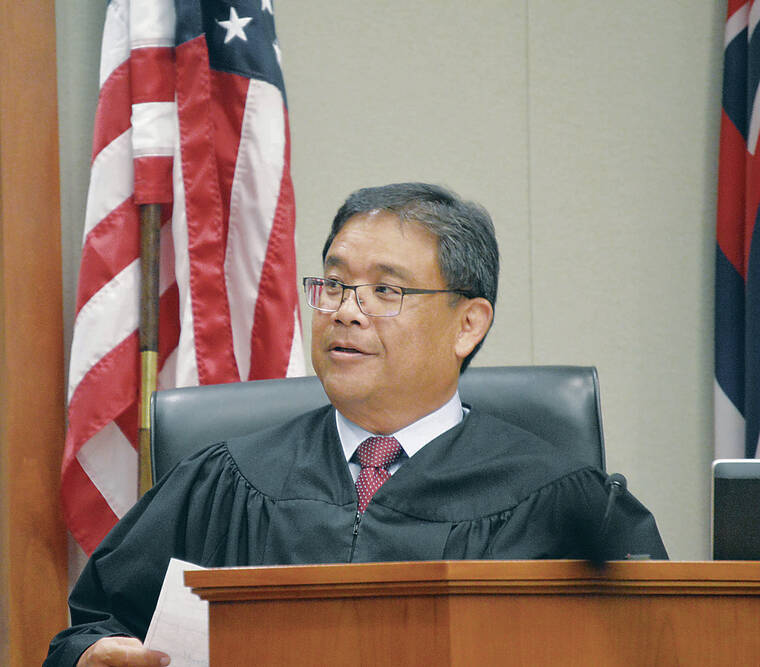Judge rules in favor of Hawaii island resort developer

TRIBUNE-HERALD
Hilo Circuit Judge Henry Nakamoto
A Hawaii island judge has ruled in favor of a developer who sued a homeowners association over long-stalled plans to build a resort in Kau.
Hilo Circuit Judge Henry Nakamoto on Oct. 2 entered a summary judgment in favor of South Point Investment Group and against the Discovery Harbour Community Association.
SPIG, a group headed by Gary McMickle, a Dallas-Fort Worth-area investor, in 2009 bought two parcels of land in Waiohinu — 11.75 acres zoned conservation and 18.23 acres zoned agricultural — separated by a road in the Discovery Harbour subdivision. The lawsuit referred to that land as the “Commercial Lots.”
SPIG also purchased the 174-acre golf course at Discovery Harbour.
“We want to go ‘old Hawaiian,’” McMickle told the Hawaii Tribune-Herald on Friday. “It’s a middle-class subdivision, and we want to keep it that way. Back in the 1960s it was planned to be a Four Seasons resort, and obviously, that’s not (now) the case.”
SPIG sued the DHCA in May 2016, accusing it of interfering with SPIG’s plans for a commercial development of the almost 30-acre subject property by falsely claiming DHCA had authority over the parcels and that the land is for residential lots. SPIG also alleged that the DHCA claimed both the property SPIG planned to develop and the golf course are subject to DHCA’s “restrictive covenants.”
Don't miss out on what's happening!
Stay in touch with breaking news, as it happens, conveniently in your email inbox. It's FREE!
The investors further claimed DHCA didn’t meet legal requirements of a homeowners association or a planned community association, and lacked the authority to “regulate, assess fees against or interfere with SPIG’s development of the Commercial Lots.”
Nakamoto ruled in favor of SPIG and against DHCA on all allegations in its suit, and against DHCA in a counterclaim.
The judge denied SPIG’s motion for attorneys’ fees but did grant the developers $5,385.42 for “taxation of costs,” which is the process of deciding how much money the winner of a lawsuit should be paid to cover their legal expenses.
Previous owners of the two parcels totaling almost 30 acres, Mark Twain Estates Inc. and later Green Sands Inc., had planned a resort on the land since the 1960s.
The original application in 1969 for a village-commercial use permit described a modest development with “construction of a small hotel-motel type operation with a restaurant, bar and office space.”
However, more ambitious plans by the late Oakland, Calif., architect Shigenori Iyama were reportedly revealed to the Planning Commission that year, including two 20-story hotel towers and 950 hotel rooms, according to an April 2018 article in Environment Hawaii.
McMickle presented a scaled-down plan to Discovery Harbour residents in May 2015, according to the Ka‘u Calendar community newspaper. That plan included a small hotel, condominiums and a shopping center. McMickle also reportedly told the residents plans include renovating the golf course.
A brief filed with the lawsuit claimed that aggressive opposition to SPIG’s plans by the DHCA caused the Ka‘u Community Development Plan steering committee to recommend “low-density urban” zoning for the development instead of its preferred designation as a “retreat resort” area.
“The DHCA’s interference in the Ka‘u CDP process has delayed development of the commercial lots and repair of the golf course lots, has cost SPIG a favorable land use designation, and has caused it to incur significant other monetary damages,” the brief states.
The low-density urban classification would allow for only single- and multiple-family residential or residential-commercial mixed-use development.
“It’s a beautiful area, and we’re open to what the community wants,” McMickle said. “We’re looking at mid-density zoning, about 500 units, and the hotel would probably be between 50 and 75 units.”
McMickle said he believes that a special use permit sought in the 1960s might be valid. But his attorney, Randy Vitousek, argued unsuccessfully in 2012 before the county’s Board of Appeals that it was valid.
According to McMickle, his development might be entitled to that permit “on grandfather” and added, “We haven’t decided whether we want to go that route or not. But we’ll probably start pursuing that the first part of (2025).”
The DHCA posted this reaction on its website: “Judge Nakamoto entered the final judgment in this case. … By court rule, the Association has 30 days from October 2nd to file a Notice of Appeal. However, given the circumstances within our community, the goal is to file as soon as possible. Our insurance carrier, Great American, has consented to finance the bond or cash deposit with the court. Our attorney will file a motion to stay enforcement of the final judgment which will request the court to approve a cash deposit of $8,078.13 as a condition of ordering a stay of enforcement. That amount is 150% of the $5,382.52 awarded to SPIG for their taxation of costs. Fortunately, the judge previously denied SPIG’s request for attorney fees and costs totaling $260,570.37.
“The appeal will be filed with the Intermediate Court of Appeals (ICA). After briefing is completed, a three-judge panel from the ICA will be assigned to decide the case. Our attorneys expect that it may take two to four years for the ICA to issue a ruling.”



